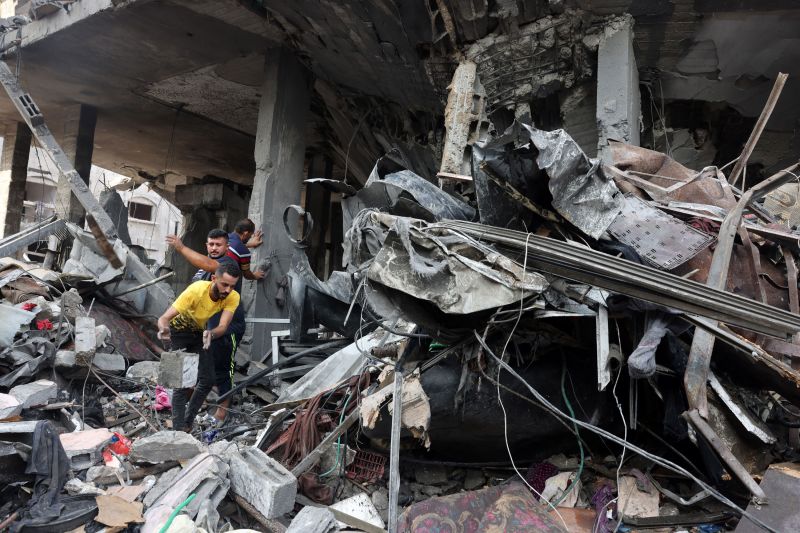
Israeli ground forces are inside Gaza as Palestinians take stock after intense overnight bombardment
Israeli ground forces are inside Gaza having entered the enclave overnight, as Palestinians experienced what they have described as the most intense round of airstrikes since Israel began its retaliation against Hamas’ October 7 terror attack.
Israeli forces “went into the Gaza Strip and expanded the ground operation where infantry, armour and engineer units and artillery with heavy fire are taking part,” Israeli Defense Forces (IDF) spokesman Daniel Hagari said Saturday morning during a press briefing in Tel Aviv.
“The forces are in the field and continue the fighting,” he added, without giving further details.
Hagari’s words confirm the military operation has undergone a significant expansion after what it had earlier described as two “targeted raids,” which took place on Wednesday night and Thursday night. Both those raids saw ground forces withdraw after a few hours.
However, it does not appear as though any major ground offensive aimed at seizing and holding significant amounts of the territory is yet underway.
The IDF said on Saturday that its warplanes hit 150 underground targets in the north of the enclave, striking what it called terror tunnels and underground combat spaces and killing several Hamas operatives.
Hagari said Gazans who had moved south of Wadi Gaza, a waterway bisecting the center of the Strip, were in an area he called a “protected space,” and would receive more food, water and medicine today, though he did not give any details.
More than 2 million people live in the enclave, which spans just 140 square miles and is one of the most densely-populated places on Earth. For weeks, people living in the territory have faced Israeli airstrikes and a growing humanitarian situation, with shortages of water, food and fuel.
More than 7,300 people have been killed and 18,500 more injured in Israeli attacks on Gaza since October 7, according to figures released Friday by the Palestinian Ministry of Health in Ramallah drawn from sources in the Hamas-controlled enclave.
Mourning in Gaza
Gazans mourned the loss of their loved ones on Saturday following a night of intense Israeli airstrikes, with many gathering at Al Aqsa Martyrs hospital in Deir al Balah in central Gaza.
Hospitals have lost contact with each other, he said, after communications networks were cut across the Strip. “People are desperate to find some news about their loved ones and their families,” he added.
Al-Dikran said that after a pause of several hours, air strikes had resumed again in central and northern Gaza, adding that artillery fire had continued uninterrupted through the night.
Aid agencies lose contact
Communications in the enclave have been severely disrupted, leaving aid agencies out of touch with their staff on the ground.
The World Health Organization’s Director-General, Tedros Adhanom Ghebreyesus, said in a post on X, formerly known as Twitter, on Saturday morning that reports of the intense bombardment are “extremely distressing.” He added: “We are still out of touch with our staff and health facilities. I’m worried about their safety.”
He said that it is “not possible” to evacuate patients or find safe shelter under such circumstances, and the “blackout is also making it impossible for ambulances to reach the injured.”
He reiterated the WHO’s urgent appeal for a ceasefire, urging those who have the power to push for one to “act NOW.”
Several United Nations agencies have also reported losing contact with their local staff in Gaza.
Lynn Hastings, the United Nations Resident and Humanitarian Coordinator in Palestine, took to X to say that “Gaza has lost contact with the outside world amid reports of intensified bombardment.”
UNICEF’s executive director Catherine Russell said in a post on X that she is “extremely concerned” about her team in Gaza after losing touch with them.
“All humanitarians and the children and families they serve MUST be protected,” Russell added.
While communications are largely severed, according to the local telecoms provider Jawwal, those with Israeli or international SIMs appear to have some patchy connections.
